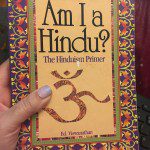The well respected Himalayan Academy and their guru Subramuniyaswami put out a book several years ago called How To Become a Hindu. Over the next few weeks I’ll be reading the chapters and discussing each one individually. Today we’re looking at the second chapter: Religious Loyalty and Commitment.
This chapter is titled Religious Loyalty and Commitment. It explains how it is important to fully commit to Hinduism and formally sever ties with other religions.
To me, that’s one way to go about it but not the only way. Though Subramuniyaswami is dismissive of universalism, I don’t see anything wrong with people forging their own paths. As one’s understanding matures and develops, so will the spiritual life. In the background that I come from, it is encouraged to find the thread of universal Truth at the heart of the world’s religions. But Subramuniyswami warns against seeing similarities in religions. They are contradictory, he says, and trying to incorporate aspects of Vedanata into, say, Catholicism would undermine both faiths.
“My own personal observation is that without a complete and final severance from one’s former religion or philosophy it is not possible to practice Hinduism fully and receive the full spiritual benefit.”
This chapter makes clear that Subramuniyaswami expects you to renounce much of your former life and take on Hinduism in word, practice, and lifestyle. There is no part way for him. You have to be all in. That includes the formal initiation ceremony at a temple, a legal name change, and using that name without ever obscuring or hiding it to fit in.
“Entrance into Hinduism means becoming a member of a new community, a new tribe, a new group mind.”
It is not enough for him if you believe Hindu beliefs and practice Hindu religion. You must also enter the Hindu community. “If she keeps associating only with non-Hindus, eating at McDonald’s, spending her evenings at the disco, committing herself totally to the shallow social life of ‘fun,’ spending all her money on herself–we certainly could not call her a good Hindu.”
He suggests that if this example woman were to accept a date from an atheist, she would be a half-Hindu only.
Personally, I think that’s a lot harsher than need be.
Our spiritual development is a journey and a discovery. To suddenly stop seeing your friends, to stop going to “the disco”, to stop having fun, in the name of dedicating yourself to a religious life…I would worry about a person who did that overnight.
I’m more in support of a slow introduction to Hindu lifestyle. And not giving up on fun or occasional selfish pursuits.
Perhaps our karma would burn faster if we went all in completely and lived an ascetic life from here on out, but if we take our time and make sure we are comfortable with each step, the karma will still be dealt with eventually.
I think Subramuniyaswami would disapprove of my marriage to a Buddhist. He would probably say I wasn’t dedicated enough to Hinduism. And I would disagree. Hinduism is an enormous part of my life. It is one of the most important things to me and I work very hard at my spiritual development.
Maybe I would progress faster if I did only Hindu things (what does that even mean???) I’m satisfied with my progress, though. I feel that I am making steady progress towards samadhi without becoming legalistic.
I have more fluidity in my thought than Subramuniyaswami and I don’t know if that’s a good thing or a bad thing! I can see why he wants to make sure that converts to Hinduism are not wishy-washy and that they take pride in being Hindus. But I think it’s okay if you are a half-Hindu, as he puts it. You have lifetimes to get where you need to be; for your soul to align with its best path to joy.
It is challenging to confidently declare one’s self to belong to a religion that is ethnically very different from you. I’ve gotten to a point where I pretty much wear my Hinduism on my sleeve. I’m not shy about stating that that’s what I am. But I wasn’t always as confident. It took time and practice to feel like I belonged.
Maybe shocking my system by starting an entirely different life would have made that faster? But I had to be true to myself and make sure I wasn’t losing myself in new ritual and fun names.
My development as a Hindu is my own personal journey and it doesn’t need to be about whether I present myself “properly” to the rest of the world. I understand the need for a community and I’m on board for that. But I don’t want to see people throw themselves into a community with such gusto that they lose the other parts of their life that bring them joy and are meaningful to them. That seems like a recipe for burnout.
However, I don’t have the years of experience or variety of observation that Subramuniyaswami had when he wrote this book.
I would like to further explore this disagreement about whether all religions lead to the same truth or if that is just dangerous propaganda. I will probably work on a post to look into that more. I’ve touched on it briefly in this post: All Religions Are Not The Same. But I think there is further exploring to do on this idea.
In the meantime, here are some points of view on the opposite side from Subramuniyaswami…
Ramakrishna, the 19th C. Bengali saint, used to say that there are as many paths to God as there are opinions about the subject. Any sincere approach, if followed to its end, will lead to God.
We can derive inspiration from Jewish, Muslim, Buddhist, and other scriptures because we see the same Truth speaking through all of them. Obviously, any religion that claims unique access to God for one tradition or one approach only we do not view as accurate. But we are happy to let anyone believe whatever they want. We know that everyone will come to God sooner or later, in this life or in a future one, so no one will be lost. God does His/Her own work in bringing people to Him/Her, so we would consider it arrogant meddling on our part to tell anyone else what religion to follow.
Swami Vivekananda, one of the first Hindu missionaries to visit America, said it very clearly: “We are not here to make a Christian a Hindu, or a Hindu a Buddhist, or a Muslim a Christian. We are here to help Hindus become better Hindus, Buddhists become better Buddhists, Muslims become better Muslims, Jews become better Jews, and Christians become better Christians.” We strive to do that by pointing out the commonalities among various religions to help people who are interested discern what is truly important and essential in their own religion and what is not. ” –http://en.allexperts.com/q/Hindus-946/Hinduism-Judaism.htm
What are your thoughts?
















